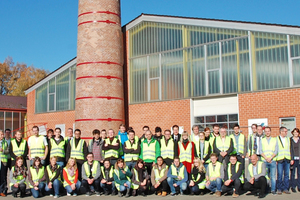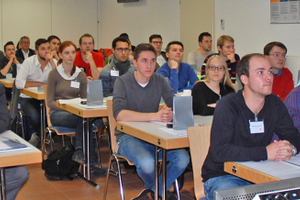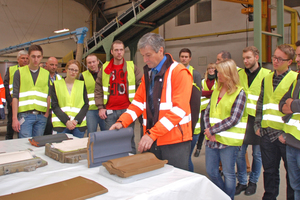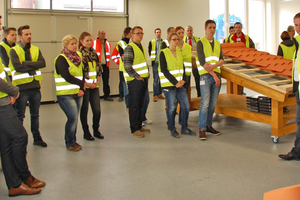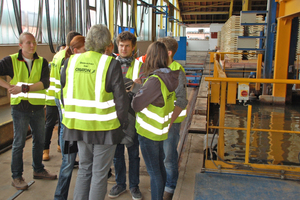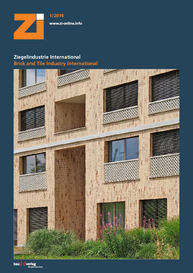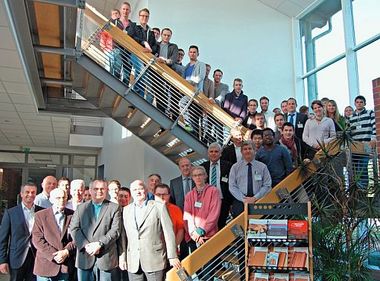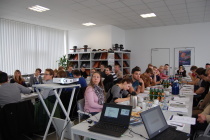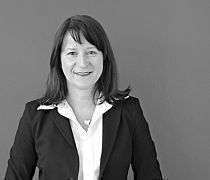Zi field trip brings together students and industry partners at a clay roofing tile plant
For the second time now, the trade journal Zi Brick and Tile Industry International arranged a field trip for students. On 2/3 November 2015, more than 30 undergraduate and graduate students along with their supervisors learned about the theory and practice of making clay roofing tiles at Creaton AG’s Wertingen and Roggden roofing tile plants. The event was supported by several sponsors.
Wertingen Roofing Tile Plant – a committed host
Creaton AG with its roofing tile plants in Wertingen and Roggden was the destination for the 2015 Zi field trip. Of the six sponsors
Grothe Rohstoffe GmbH & Co. KG, Bückeburg
Händle GmbH Maschinen und Anlagenbau, Mühlacker
Keller HCW GmbH, Ibbenbüren
Hans Lingl Anlagenbau und Verfahrenstechnik GmbH & Co. KG, Krumbach
Opavsky Emailleschmelze & Glasurenfabrikation Josef Opavsky und Sohn, owner Dipl.-Ing. (FH) Heinz Kropp GmbH, Vallendar
Refratechnik Ceramics GmbH, Melle
five of them had already taken part at the previous year’s event. This demonstrates the huge commitment of these companies to attracting young professionals into the industry. All industry partners underline the promotion of young industry professionals on their agenda. They see the field trip as an ideal opportunity to get talking with the future graduates and get them interested in their companies. Each presented a technical talk and gave an overview of their company and the career opportunities. They informed the students not only about the technology in heavy clay ceramics, but also potential for career entry and development in their companies.
The students came from Nuremberg’s Georg Simon Ohm University of Technology, Faculty of Materials Engineering (under the direction of Prof. Dr. rer. nat. Wolfgang Krcmar) and the University of Coblenz, WesterWaldCampus, Department of Materials Engineering, Glass and Ceramics (director: Dr.-Ing. Christian Schäffer).
Creaton AG, as the hosting plant, had been quick to give us a yes to our enquiry. Our thanks go to the entire Creaton team, from marketing to production, who actively and enthusiastically supported us. The spacious training rooms in the Wertingen plant provided an excellent venue and framework for the event.
Creaton – natural clay sets the tone
The clay roofing tile manufacturer Creaton reported sales of € 191 mill. in 2014, employing 890 people at nine sites and in 15 plants across Europe. It manufactures a wide array of products, from flat to plain tiles with the matching accessories.
Kristin Draeger, Personnel Officer at Creaton, explained to the students the possibilities for a career at Creaton, which, for instance, can begin with a dual course of study. The company offers its employees various schemes for further training and development, including the Creaton Campus and an executive development programme.
Ferdinand Kanefzky, Creaton Plant Manager in Wertingen and Roggden, presented the Wertingen site, which was founded in 1884, originally producing masonry bricks as well as roofing tiles. In 1980, a U-setter plant was built. In 2008, following a fire, a new tunnel kiln as well as loading and unloading equipment were installed. Today, currently in two-shift operation, around 55 employees manufacture approx. 18 mill. flat tiles and 800 000 accessories per year, 95% of which are engobed or glazed.
Energy-optimized clay brick production – present and future
Harald Gruber, Lingl GmbH & Co. KG, spoke about the medium-sized company based in Krumbach, whose 500 employees include 20 % university graduates and 20 % masters in their trade/technicians. With an export share of up to 90 %, Lingl supplies 600 customers worldwide in heavy clay ceramics, ceramic sanitaryware and technical ceramics as well as in the refractories industry. Lingl offers diverse possibilities for employment, which Harald Gruber outlined to the students.
In his technical talk, Manuel Bürzle described to the students the possibilities for energy saving with reference to specific examples. He asked: Where does the energy go? When drawing up an energy balance in heavy clay ceramics, it was important, he explained, to regard kiln and dryer as single consumers as well as in combination. Raw material studies and optimizations could also reveal potential for savings. With regard to energy losses, the order of the day was: avoid, reduce and utilize.
Wertingen plant tour
In an exhaustive plant tour, the students learned all about the Wertingen plant, from preparation, shaping to handling, drying, firing and packing. They also toured the plaster mould-making shop. As some students found themselves in a roofing tile plant for first the time, many questions were asked and answers provided. Ferdinand Kanefzky vividly explained the individual process steps to the students and presented intermediate and finished products.
As ingredients for the ceramic body, three raw materials are used in Wertingen: one clay and two loess loams. Prepared in a pan mill and two roller mills, the batch mix is then soured in a 5 000 m³ souring facility. The clay body is sent to a circular screen feeder, double-shaft mixer and a bat extruder before the roofing tiles are given their shape on a DR6 4-field press. In a chamber dryer that holds 33 chambers, each with 4 604 tiles, the tiles are dried at least 48 h at a temperature of 75° C. In the glazing/engobing unit installed in 2006, depending on the product, between 15 and 30 g engobe/glaze are applied to the roofing tile. Two loading robots set 14 to 16 roofing tiles in the U-setter, which is then placed onto a kiln car. Creaton sets 90 tunnel kiln cars for flat tile firing, every tunnel kiln car is loaded with 2 560 tiles. After firing, the products are unloaded and strapped by means of ultrasonic welding to small packs. The accessories are fired in H-setters. All the accessories can fit into the reversible setters. Each of the 20 tunnel kiln cars for accessories hold 520 setters. The kiln holds a total of 49 tunnel kiln cars, the firing cycle lasts at least 44 h.
Another station on the tour was the Creaton Campus. Here the students received an insight into tiling a roof with the clay tiles and the entire roof structure. Another topic was the accessory products necessary for a full-ceramic, functional and aesthetically appealing roof.
Possibilities for the surface design of roofing tiles from development to production
In the afternoon, Hans Otto Ströder presented the traditional Emailleschmelze & Glasurenfabrikation Opavsky, which also supplies many Creaton plants. The company produces frits, glazes, engobes and enamels with its own smelting operation with four rotary kilns and tailors every development to the customer’s operating conditions. Opavsky currently employs twelve ceramic engineers and technicians. Ströder emphasized that quality requirements had increased considerably in recent years and roofing tiles would sometimes be judged like wall tiles, which entails elaborate development work. He showed the students the development of a roofing tile glaze from the customer idea to the finished product. Ströder stressed that hierarchies at Opavsky were flat, which brought high responsibility potential for wide-ranging decisions. Ströder invited interested students to simply arrange a date to talk to him.
Speed dating and get-together
One goal of the event is to network the companies and students with each other. For this reason, to close the event, all students were given the opportunity to question the representatives of the industry partners in a speed dating format. Split into five groups, the representatives presented their company and answered questions – after ten minutes everyone moved on to the next table. This went down very well with everyone and provided an uncomplicated setting for first meetings.
The convivial evening event at the “Riegele” brewery in Augsburg was another opportunity to establish contacts. The industrial partners and the students had a chance to discuss bachelor and master theses or even career entry.
Development of lightweight, energy-saving, refractory products focussing on “Modern methods for setter development”
Joachim Dörr and Holger Werges, Refratechnik Ceramics GmbH, introduced the students to the globally operating Refratechnik Group. The family-run company employs 1 800 people and, besides refractories for the ceramic industry, it manufactures products for the steel and cement industries. As a system supplier, Refratechnik Ceramics not only supplies the refractory structure for the kiln ceilings and walls, but also tunnel kiln cars and setters. In the development of setters today, modern methods are applied, for example FEM. Especially the mechanical and thermal stability must meet high requirements, important is a low setter weight and maximized diversity of configurations to enable as many of the products as possible to be fired on just one setter.
“Enviro kiln” – in the right direction with our new countertravel kiln
The representative of Keller HCW GmbH, Holger Rottmann, began with an overview of the plant engineering company. Keller employs around 450 people at different sites. Around 330 of these work in Ibbenbüren. Rottmann pointed out the main career opportunities within the company, which offers an interesting career start for graduates. He then presented the newly developed concept of the Enviro kiln, which was premièred at ceramitec. Keller has an extensive test programme to test various products such as roofing tiles, facing bricks and also lightweight vertically perforated bricks in the kiln. As a result of the roofing tile tests, for example, a very good temperature homogenization is achieved, which is based on the individual treatment of the products and enables cooling rates of 90 K/h instead, for example, 45 K/h.
The small but significant difference in the engobe and glaze development for ceramic construction products
Jens-Uwe Flemming gave the final talk of the day and presented the company Grothe Rohstoffe GmbH & Co. KG. With more than 50 employees, including twelve ceramic engineers, the well cross-networked Bückeburg-based team develops, produces and distributes ceramic colours worldwide.
Pursuant to Flemming, the company’s philosophy consists in constant innovation process on all levels of the company, taking into account the development of the individual strengths of the employees.
Michael Optenplatz then spoke about the special aspects that are important in the development of roofing tile glazes, from the physical/chemical properties to slip quality and firing technology. The complexity of this development process was exemplified by the influences of alkaline earth oxides on glaze development, as recently discussed in the Grothe team.
Roggden plant tour
As Thomas Wagner, Händle GmbH Maschinen und Anlagenbau, suddenly fell ill, his talk headed “From mine to shaping” was regrettably cancelled.
Instead, Creaton invited the group to tour its plain tile plant in Roggden. Here the students had the possibility not only to learn about tile production, but also to see a casing kiln. Impressed by the wide spectrum of colours for the roofing tiles, the group then went on into the Creaton laboratory, which is fitted with an extensive array of equipment and is used for raw materials analysis, product assessment and body optimization.
Conclusion
The 2015 field trip to Creaton AG’s Wertingen and Roggden plants met with great interest and enthusiasm. Many of the students praised the opportunity to get together with potential employers and profit from their experience. How successful this can be is shown by the example of Opavsky, as this company is now working together with a student from the previous field trip.
An evaluation of questionnaires on the event revealed that 96 % of the students were satisfied to very satisfied with the selection of topics with regard to their professional careers. With the technical quality of the papers, 100 % were satisfied to very satisfied. The plant tour is always a highlight of the event.
For the students, it is particularly interesting when the speakers talk about their own development paths and make clear how careers can take very different courses. As well as wanting to obtain technical knowledge, the students are always interested in information about training, entry and career opportunities in the different companies.
For the industry partners, the presentation of their companies and the contact to the students is a good opportunity not only to meet future professional employees and establish ties to them, but perhaps also to meet potential customers.
Prof. Dr.-Ing. Christian Schäffer expressed his gratitude in the name of all participating universities for the successful event. For the students, he said, it was important to gain an insight in the technology of the brick and tile industry and its suppliers. The Zi field trip provided an excellent opportunity to get to know each other and exchange information.
Thanks go to the 2015 host, Creaton AG, for its extensive support of the field trip and our industry partners whose contribution made the event possible in the first place. Working together, we give the future management executives the chance to get a feel of the clay brick and tile industry and its supplier industry and to establish first contacts.
Outlook
We all have to do more to attract talented young graduates into our industry! For this reason, we want to offer another field trip to a brickworks in 2016. If you are interested in hosting the next student field trip at your brickworks or in supporting the event as an industry partner, please ring me (+ 49 5241 8089264) and I shall pencil you in!

